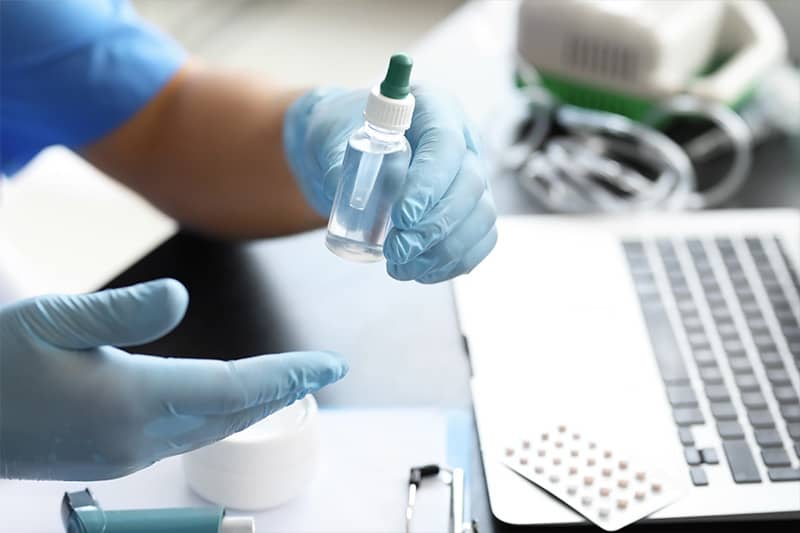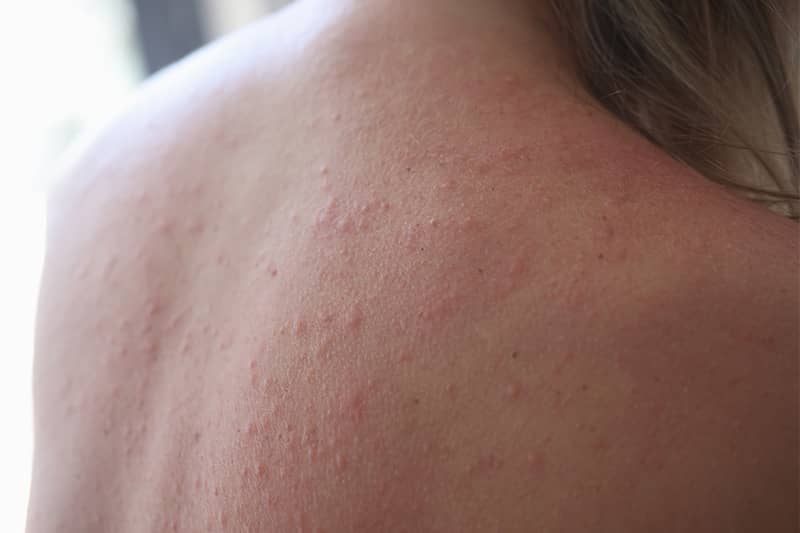Your immune system is crucial for keeping you safe and healthy by fighting off threats. If you suffer from allergies, however, it’s because your immune system is viewing a harmless substance, such as pollen or peanut butter, as a threat. While a pollen allergy can simply mean a few days of sneezing and coughing here and there, there are some allergic reactions that can be extremely dangerous. The professionals at Becker ENT and Allergy in Robbinsville, NJ, can help you determine the source of your allergies, create a treatment plan, and help you control your symptoms for a happier, healthier life.
What Is an Allergy Doctor?
An allergy doctor is an immunology specialist who can help you to better understand:
- What your allergy triggers are
- Why your body reacts the way it does
- How to reduce and manage your symptoms
Allergies can actually be quite dangerous over time as your body starts to react more aggressively when exposed to an allergen. For example, some food allergic reactions start with vomiting, while repeated exposure can lead to an anaphylactic reaction, which can be fatal.
Working with your Robbinsville immunologist to get your allergies under control may be a long process. An immunologist can help you reduce the severity of your reactions and protect you from the most dangerous and severe reactions by providing emergency medications. This course of treatment is more involved than medication, but the benefits can greatly reduce your anxiety.

How Can an Immunologist Help?
Your allergy doctor is the first professional to contact when your allergy flare-ups cannot be controlled by over-the-counter medication. Prescription medication can do a great deal to lessen the severity of your symptoms and reduce your discomfort.
You should definitely contact an immunologist if you have seasonal allergies that contribute to:
- Sinus infections
- Asthma flare-ups
- Breathing challenges after exercise
Your Robbinsville immunology professional can provide immunotherapy (typically allergy shots) to reduce the severity of your reactions over time. Allergy medications work to suppress the response and relieve symptoms, while immunotherapy works to lessen allergic reactions altogether. Even if you never get to the point where you can celebrate the spring and the ragweed that comes with it, you can avoid the pain of sinusitis and the drowsiness of being overmedicated.
Allergy Shots
Immunotherapy uses controlled exposure to build up the body’s resistance to triggering substances, called allergens. This exposure is most often done with allergy shots, which contain very small amounts of the allergen itself.
It’s understandable that a patient would want alternatives to allergy shots. By using medicines and avoiding their allergens, the person may have the goal of putting off allergy shots for as long as possible.
But immunotherapy works best when started sooner, not later. That’s because allergies tend to get worse, not better, as time goes on. Allergy shots reduce the symptoms as the patient gets older, preventing further damage that can lead to asthma, sinus inflammation, and other illnesses. The patient will also be much more comfortable and enjoy a better quality of life.
How Long Will Immunology Therapy Take?
Every person’s immune system is different. Your allergy doctor will first help you to determine exactly what it is that you are allergic to. Once that has been properly diagnosed, they may recommend immunotherapy.
Immunotherapy refers to controlled exposure to allergens in order to increase your tolerance to the substance that is triggering your response. This therapy offers a great deal of hope to those with a strong risk of reaction to respiratory allergens such as pollen and dust mites, particularly for those with an asthmatic reaction over time.
The course of immunotherapy treatments can take several years. Initially, you will come in for treatments more frequently, with visits slowly tapering off over time. Typically, immunotherapy is performed with allergy shots.
What Can I Expect From My Consultation?
Your initial allergy consultation will likely include a review of your full medical history, a conversation about the medications you have taken for your allergies in the past, and your current health status.
If you are struggling with any inflammatory conditions, such as rheumatoid arthritis, you may also want to consult with a member of our immunology team. Your Robbinsville immunologist may ask you to prepare for an additional consultation that requires you to keep a food diary and to track your discomfort over time.
Additional Therapies to Consider besides Immunology Therapy
If you have long struggled with respiratory allergies and sinus problems, your allergy doctor may recommend that you consider sinus surgery to repair structural problems that are not allowing your sinuses to drain properly. This can include anything from simply expanding the nasal passages to removing polyps or even altering the bone structure. However, the risks are low and many who go through the surgery enjoy greatly improved health over time as their sinus inflammation is reduced.
Allergies are about much more than sneezing. Having constantly plugged sinuses can cause snoring, which limits the quality of your sleep. Over time, this can cause weight gain, which can lead to more snoring or put you at risk of diabetes and sleep apnea, as well as being hard on your joints. Getting a handle on respiratory allergies can greatly improve your life.

For those with food allergies, knowledge and awareness are key. It is also important to note that not every food that triggers a reaction will act quickly on your immune system. You may vomit or notice a rash immediately when exposed to an allergen, or you may digest the food and suffer a lot within the next several hours.
Your immunology team may recommend a thorough food diary that can help you avoid triggers that lead to:
- Nausea
- Constipation
- Belching
- Flatulence
- Nasal irritation
- Red or itchy eyes
- Systemic inflammation
Tracking what you eat and how your body responds can be a terrific tool both for you and your immunologist. Armed with this data, you may even learn that foods you once considered a problem are actually only causing issues when paired with another food, which may give you more dietary flexibility. Your Robbinsville allergy team can help you build a food diary that travels well.
Food tracking can offer many benefits as your awareness increases. For example, some foods may trigger inflammation and increase an arthritic response, while others cause a runny nose. If these foods are favorites, you may find that you can have them during warmer months and not suffer much arthritis pain, but in the winter the pain reaction is worse. A long-term relationship with an experienced immunologist and immunology team can go a long way towards being more comfortable in all aspects of life.
Allergist FAQs
Allergies can get worse over time. They can also contribute to sinus inflammation, infections, and asthma risk. Getting on top of them before these conditions flare up can greatly improve your life.
Current indications show that slow exposure to nuts may not reduce the risks of severe reactions. However, allergy management is constantly changing and new medications for anaphylactic risks are growing. Regular appointments with an immunology specialist are recommended for the management and potential treatment of dangerous allergies.
Allergies can have a big impact on your appearance and treating them effectively will help. Your allergist can assist you in finding the best way to reduce sinus pressure, eye dryness, and nasal irritation.
Moving away from allergic triggers is a temporary fix and may not work, as seeds seem to spread as fast as people do. Getting on top of your allergy exposure risk is important no matter where you live if it contributes to your asthmatic inflammation. Schedule an appointment to better understand what is triggering your asthmatic reaction.
Driving Directions
Our office is located at 1 Union Street #203 Robbinsville, NJ 08691. Here are driving directions for points of interest you can enjoy in the area.
From Van Nest Wildlife Refuge:
- Take Hugh’s Drive toward Youngs Rd
- Turn left onto Flock Rd
- Turn left onto Mercer St
- Continue onto Hutchinson Rd
- Turn right onto Washington Blvd
- Turn left onto Union St
- Turn left, then right to reach our office
From Six Flags Great Adventure Theme Park:
- Take I-195 W via Monmouth Rd
- Take exit 7 for County Rd 526 W toward Robbinsville
- Continue onto NJ-33
- Turn right onto Washington Blvd
- Turn left onto Union St
- Turn left, then right to reach our office
Schedule your Appointment Today
Getting a handle on your allergies will take time, but it will be time well spent when you can finally enjoy the world safely and comfortably. Contact Becker ENT and Allergy for a conversation about your concerns and questions. We are excited to help you move toward an improved quality of life!

